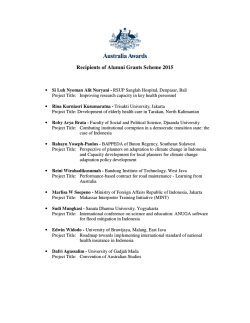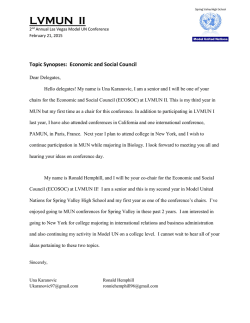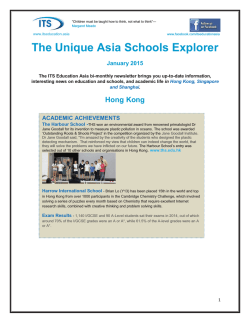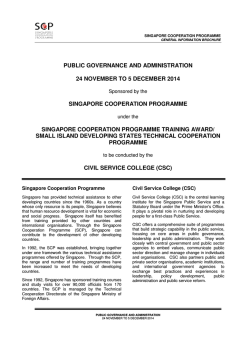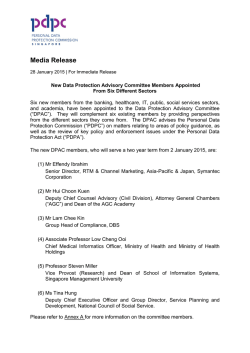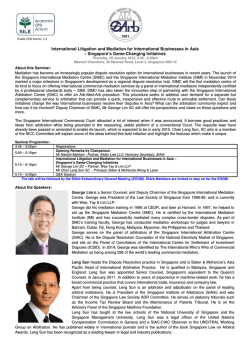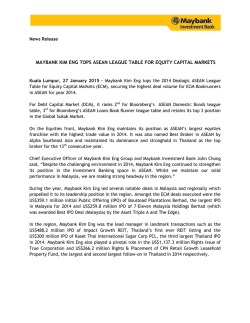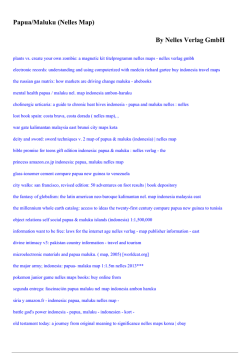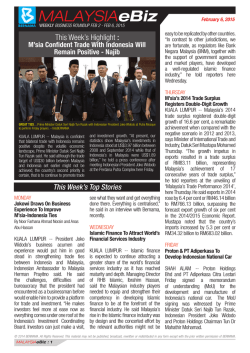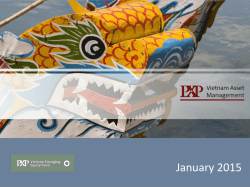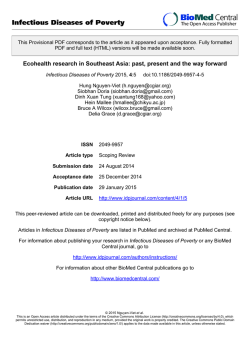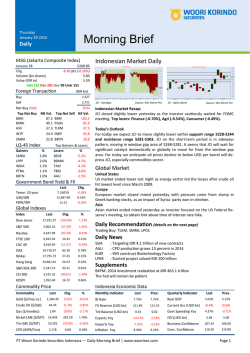
ASEAN - economic bulletin - January 2015.
ASEAN ECONOMIC BULLETIN January 2015 HIGHLIGHTS Lower international oil prices have had a dramatic, and mostly positive, impact on the majority of SE Asian countries – reducing inflationary pressure and spurring reform of popular but wasteful fuel subsidies. But net oil exporter Malaysia has been adversely affected. Indonesian President Joko Widodo has fulfilled one of his main campaign pledges by introducing substantial reforms to fuel price subsidies - freeing up government spending for key policy priorities, including infrastructure development and social welfare. At the end of 2014 the Malaysian government announced it was effectively scrapping subsidies for petrol altogether. Singapore‟s central bank surprised markets by relaxing monetary policy on 28 January, helping to ensure deflation (falling prices) does not become entrenched and shoring up economic growth. Infrastructure UK visited Thailand, Indonesia and the Philippines in January to share UK experience on public private partnerships (PPP) - supporting the authorities in these countries in their efforts to increase the role of the private sector in infrastructure development. The European Commission may request an opinion from the European Court of Justice on whether the EU-Singapore Free Trade Agreement should be ratified by national parliaments as well as the European Parliament. If this happens it could delay implementation of the deal. There is some optimism that negotiations on the EU-Vietnam Free Trade Agreement will conclude in the first quarter of this year. There have been welcome reforms in Indonesia and Vietnam that could help improve the business environment in those countries. But there is concern over new reinsurance regulations in Indonesia. The inaugural UK-Singapore Financial Dialogue and London-Singapore Renminbi Forum took place in Singapore on 27-28 January, boosting collaboration between two of the world‟s four largest international financial centres. Economic Developments 1. The significant drop in international oil prices has been welcome news for most countries in the region, reducing inflationary pressure and reducing costs for businesses. Thailand, Vietnam and the Philippines have seen a sharp decline in headline inflation Figure 1: Inflation Rates in Major SE Asian Economies (% change on a year earlier) 9 8 7 rates (see Figure 1). Singapore entered a period of deflation (falling prices) in November. The inflation 6 Indonesia 5 Vietnam 4 rate has been falling since the middle of 2014 due Philippines 3 Malaysia 2 to measures to cool the property market, following a period of high inflation and soaring housing costs. Thailand 1 Singapore 0 -1 The fall in international oil prices has added to the deflationary pressure. 2. Source: National Statistics The fall in global oil prices provided the ideal environment for Indonesian President Joko Widodo to reform popular but wasteful fuel subsidies. In mid November last year the government raised administered fuel prices by 30%, followed at the end of December by the introduction of a new scheme which abolishes subsidies for gasoline altogether and fixes, at a lower rate, subsidies for diesel and kerosene. Three quarters of the nearly £10 billion of public funds made available by these reforms will be used to increase spending on prioritiy areas, in particular infrastructure development, food security and social protection – including the president‟s new “Prosperous Family Card” scheme. The other quarter will be used to reduce the fiscal deficit, currently running at around 3% of GDP. The government believes this will help lift economic growth to 5.8% in 2015, though the World Bank and Asian Development Bank (ADB) are not as optimistic. The increase in administered fuel prices pushed inflation up to its highest level in six years in December, making Indonesia an anomaly in the region (see Figure 1), although the impact is expected to be temporary. 3. As a net exporter of oil, Malaysia has been adversely affected by falling international prices. The oil and gas sector contributes around 30% of government revenue and 20% of GDP. The government‟s revised national budget for 2015 predicts slower economic growth this year, 4.5-5.5% and a slightly higher fiscal deficit at 3.2% of GDP. But, as was the case in Indonesia, falling international oil prices have helped trigger overdue reform of fuel subsidies and increased the pressure to diversify the economy – both of which will serve Malaysia well in the long run. Subsidies for petrol have been completely removed and replaced with a mechanism that links domestic prices with movements in international prices. Small subsidies remain in place some other types of fuel. ASEAN Economic Bulletin - January 2015 2 4. The Thai economy has been slow to recover due to sluggish domestic demand, weak exports and the slow disbursement of government funds. GDP is estimated to have grown by just 1% in 2014. The National Economic and Social Development Board predicts economic growth will pick up to 3.5-4.5% in 2015, fuelled by increased public expenditure on infrastructure. But this would still be below potential and there are risks to the outlook. Tourist arrivals are steadily rising but have still not fully recovered. Exports to other ASEAN markets are performing well but this is negated by the impact of the slowing Chinese economy. Thailand‟s exports to the EU could be adversely affected by the expiration of the country‟s preferential tariff access to Europe, through the Generalised System of Preferences (GSP) scheme, on 1 January 2015. Lower inflation at least enables the central bank, Bank of Thailand, to maintain its loose monetary policy stance to support growth. 5. The Monetary Authority of Singapore (MAS, central bank) made a surprise and unprecedented announcement to ease monetary policy on 28 January. In its first unscheduled statement since 2001, MAS announced it would now allow the Singapore Dollar to appreciate at a slower rate against a trade-weighted basket of currencies - the method used to maintain price stability in the small, open, economy. The surprise policy move had a knock-on effect on other currencies in the region, most notably the Malaysian Ringgit and Thai Baht. Looser monetary policy in Singapore will help avert sustained deflation and ensure growth remains on target to reach 2-4% in 2015 (read more on Singapore‟s growth prospects in 2015). 6. The Philippine economy grew by 6.1% in 2014, down from 7.3% in 2013 and below the government‟s 6.5% target – but still one of the fastest growing economies in Asia. The struggling agricultural sector and weak government spending are negating the benefits from strong growth in the services sector and private consumption. But the IMF and World Bank believe lower input costs from cheaper oil will boost growth this year to 6.5%, while the ADB forecasts 6.4%. Inflation concerns have also eased due to successive monetary policy tightening by the central bank, Bangko Sentral ng Pilipinas (BSP), in late 2014 and lower energy prices. This potentially enables the central bank to switch to a more „pro growth‟ monetary policy stance. 7. Vietnam‟s economy expanded by 6% in 2014, up from 5.4% growth in 2013. Rising manufacturing output, supported by robust foreign direct investment (FDI) inflows, is a key driver of growth. Exports continue to outpace imports, resulting in a sustained trade surplus. Positive macroeconomic conditions prompted international agencies to upgrade Vietnam‟s credit ratings in late 2014, and helped the government to successfully issue $1 billion of bonds on the international capital markets. The government is targeting 6.2% growth this year and believes inflation will remain below 5%. But economic growth remains below potential, constrained by weak banks and inefficient state-owned enterprises (SOEs). The reform of both has been gradual. ASEAN Economic Bulletin - January 2015 3 8. According to the ADB, Burma‟s economy is on track to grow by around 8.5% this year – supported by rising FDI inflows, commodity exports, tourism arrivals and credit growth. But despite falling oil prices, inflation is expected to rise slightly to around 7% in 2015, due to higher public sector wages, electricity tariffs and property prices. Crude oil exports, along with natural gas, are a major component of Burma‟s economy, making the global price slump a potential cause for concern and complicating the agreeing of terms with foreign firms who were awarded offshore blocks for exploration in 2014. The Ministry of Energy is currently considering whether to reduce fuel subsidies. 9. Infrastructure UK (IUK) visited Thailand, Indonesia and the Philippines in January to share UK expertise and experience on public private partnerships (PPP) for infrastructure and social services. Workshops in Jakarta were aimed at helping the Indonesian government enhance the organisation and governance of its PPP policy framework and new regulations, which are expected to come into force soon. Capacity building workshops in Thailand assisted the authorities as they develop new sub-regulations on PPP, in support of the country‟s large infrastructure programme. IUK‟s visit to Manila built on a long-standing relationship with the Philippines on PPP. During one of the IUK events, the Philippines PPP Centre announced that the government would roll out £1 billion worth of new PPP projects, covering port modernisation and prison construction. Trade Policy Developments 10. The final chapter of the EU-Singapore Free Trade Agreement (EUSFTA), on investment, was formally concluded in October last year. But ratification could be delayed as the EU Commission has indicated that it will first request an opinion from the European Court of Justice on whether the agreement should be ratified by EU member states in addition to the European Parliament. If this happens there would be a significant delay to ratification. The EU and th Vietnam concluded their 11 round of FTA negotiations in Brussels on 23 January. The final round of negotiations will be held in Hanoi in March and there is some optimism that the FTA could be signed in the first half of 2015. 11. Legislations covering the liberalisation of the engineering, architectural and quantity surveying sectors in Malaysia have been passed by Parliament. But barriers to foreign participation remain and the precise rules regulating the sector are expected to be fine-tuned further by the respective professional Boards. The UK Foreign Office‟s Prosperity Fund is supporting the Malaysian authorities in their efforts to liberalise these sectors. 12. At the end of 2014, Malaysia and Indonesia signed a bilateral agreement that paves the way for ASEAN to proceed with modest banking sector integration. ASEAN members are expected to sign a protocol soon which will enable bilateral discussions to begin between member states on reciprocal banking liberalisation. ASEAN Economic Bulletin - January 2015 4 Business Environment and Regulatory Developments 13. The Indonesian financial regulator (OJK) recently announced a new set of requirements for insurers, aiming to increase the retention of reinsurance premiums within Indonesia. But there are concerns this could reduce foreign participation in Indonesia‟s reinsurance industry and hamper cross-border risk diversification. 14. Indonesian President Joko Widodo officially launched a new “one-stop-shop” for business licenses on 26 January. Senior representatives of the key ministries involved in issuing licenses will be based in the Investment Coordination Board (BKPM), a significant change which means the reform could potentially have more of an impact in terms of improving the business environment than previous initiatives. The World Bank‟s Doing Business 2015 report ranked Indonesia 114 out of 189 countries in terms of the quality of their business environment, up slightly from 117 the previous year. Indonesia‟s ranking has not improved significantly in the last few years, as has been the case for some other ASEAN members – notably the Philippines (see Figure 2 below). Vietnam‟s National Assembly passed amended laws on investment, enterprises and tax in November - potentially leading to improvements in the country‟s business environment. Figure 2: Ease of Doing Business Rankings in ASEAN Singapore Malaysia Thailand Vietnam Philippines Brunei Indonesia Cambodia Laos Burma 2015 global ranking (2011 ranking) 1 (1) 18 (21) 26 (19) 78 (78) 95 (148) 101 (112) 114 (121) 135 (147) 148 (171) 177 (n/a) Change - 3 7 - 53 11 7 12 23 - Source: World Bank 15. Over 60 UK and Singapore financial firms and their corporate clients took part in the first London-Singapore Renminbi Forum on 27 January in Singapore. Participants identified opportunities for greater collaboration between the two largest offshore renminbi markets outside Mainland China and Hong Kong. The inaugural UK-Singapore Financial Dialogue took place the following day. Regulators and officials from both sides exchanged views on the latest national, regional and global economic developments, and agreed to boost cooperation on regulatory issues, infrastructure financing, Islamic Finance and ASEAN integration. They also welcomed the launch of TheCityUK‟s ASEAN Market Advisory Group. ASEAN Economic Bulletin - January 2015 5 For further information please contact: SE ASIA ECONOMIC & TRADE POLICY NETWORK REGIONAL DIRECTOR: Peter Mumford – [email protected] BURMA: INDONESIA: MALAYSIA: PHILIPPINES: SINGAPORE: THAILAND: VIETNAM: Anthony Preston – [email protected] Ibnu Wiyono – [email protected] Fadli Hafiz – [email protected] Aaron Chan – [email protected] Francesca McKee – [email protected] Boonyarat Kittivorawut – [email protected] Pham Thuan Hai – [email protected] SE ASIA IP ADVISOR: Christabel Koh – [email protected] PROSPERITY FUND MANAGER: Benjamin Chew – [email protected] Disclaimer: In providing the information in this document the FCO do not assume or undertake any legal responsibility to those who read it and choose to take it into account when making any decisions arising out of it. No representations or warranties, express or implied, are made or given by FCO as to the accuracy of this report, its completeness or its suitability for any purpose. None of the report‟s contents should be construed as advice or solicitation to purchase or sell securities, commodities or any other form of financial instrument, or to enter into any form of commercial or personal liability or contract. No liability is accepted by the FCO for any loss or damage (whether consequential or otherwise) which may arise out of or in connection with the report. The opinions expressed in the report are those of the individual authors and not the FCO as an organisation. ASEAN Economic Bulletin - January 2015 6
© Copyright 2026
